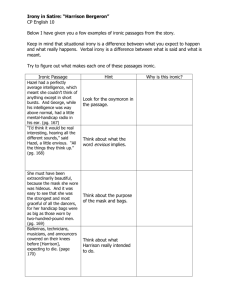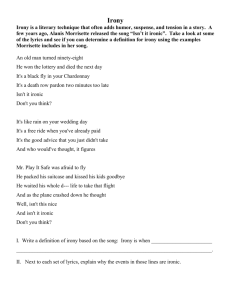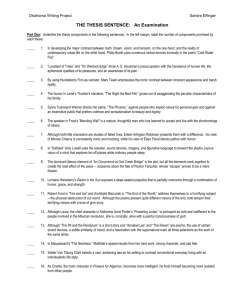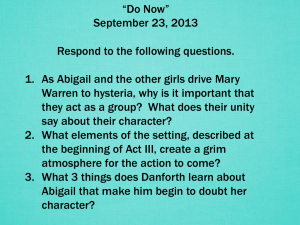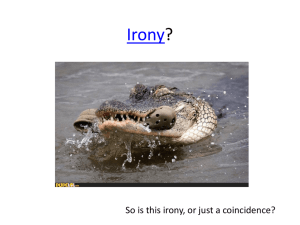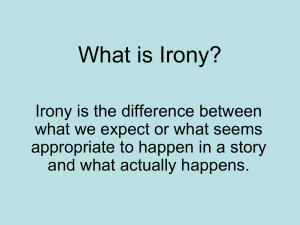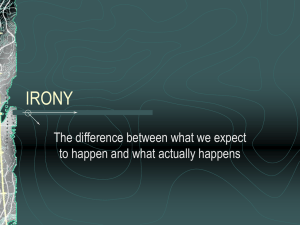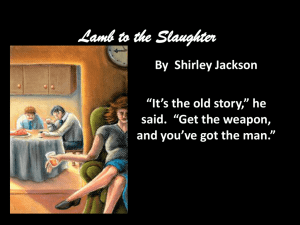politeness and irony principle
advertisement
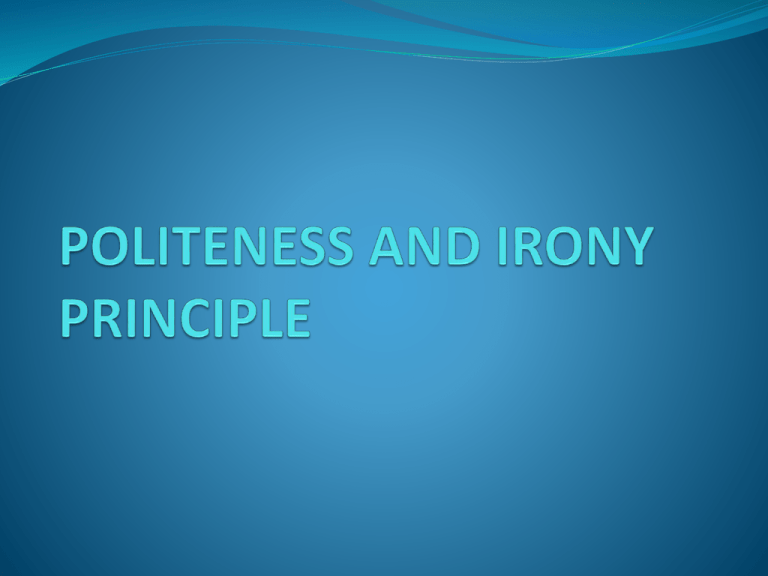
According to George Yule (1996) in his book “Pragmatics” the traditional linguists have no real social lives whereas the modern linguists tend to consider that linguistic interaction has a tight relation to social interaction. The definition of Politeness Politeness is the awareness of another person’s face. The word “Face” in this case refers to the public selfimage of a person. . Two important factors There are two important factors in PP (Politeness Principle): Age and Power. Towards the older and the more powerful authority we pay respect since there is a distance. Towards the same age and power there is a closeness or friendliness. An Example A. Excuse me, Mr. Buckingham, but can I talk to You for a minute? B. Hey, Bucky, got a minute? Greeting somebody by uttering “Mr”+Last name shows that there is a distance and respect whereas uttering one’s first name shows friendliness or closeness. Important terms “Face wants “ refers to the expectations dealing with one’s face or public image. “Face threatening act” refers to a threat/ancaman to another self-image. “Face saving act” refers to an act of saving one’s self image. An example One day a young neighbor was playing music so loudly in the middle of the night. At the same moment there was a couple of older people who were trying to sleep. The husband: “I’m going to tell him to stop that awful noise right now” The wife: “Perhaps you could just ask him if he’s going to stop soon because it’s getting a bit late and people need to get to sleep. The saying of the husband is an example of face threatening act whereas the saying of the wife in an instance of face saving act. Negative and positive face A person’s Negative face is the need to be independent, to have freedom fo action, and not be imposed on by others. E.g: “mind your own business”, “I don’t care”, “Who cares?”, “I want to be alone”. A person’s positive face is the need to be accepted, even liked, by others. In short, a need to be connected. A unique pattern of politeness principle Pre-Request One way of avoiding risk is to provide an opportunity for the other to halt the potentially risky action. A: Are you busy? (pre-request) B: not really (go ahead) A: Check over this memo. (request) B: Okay (accept) C: Are you busy? (pre-request) D: Oh, sorry (stop). Ironical principle Irony indicates that what is meant is the contradictory of what is said. The use of irony is intentional. In other word, we employ this linguistic device in utterance if we want the addressee to encode the extra meaning hidden in the ironical remark. Irony is contradicting either what the speaker has said or usually says, or, contradicting what the take to be true. To read the irony a hearer or reader do not just have to know the context, but also have to be committed to specific beliefs and positions within that context (Colebrook, 2004: 166, Martina Stykatova, 2009: 53). Types of irony Verbal irony is a disparity of expression and intention: when a speaker says one thing but means another, or when a literal meaning is contrary to its intended effect. An example of this is when someone says "Oh, that's beautiful", when what they mean (probably conveyed by their tone) is they find "that" quite ugly. It's kind of ironic that if I get my Ph.D., I'll be a real doctor. Marcia Cross It is an ironic habit of human beings to run faster when we have lost our way. Rollo May It's ironic … At times like this you (American Judeo-christian) pray but a bomb blew the mosque up yesterday there's bombs on the busses , bikes, roads inside your market your shops, your clothes. (Linkin’ Park “Hands held high”) Dramatic irony is a disparity of awareness between actor and observer: when words and actions possess a significance that the listener or audience understands, but the speaker or character does not, for example when a character says to another "I'll see you tomorrow!" when the audience (but not the character) knows that the character will die before morning. An old man turned ninety-eight He won the lottery and died the next day It's a black fly in your Chardonnay It's a death row pardon two minutes too late And isn't it ironic... don't you think (Alanis Morissette “ironic”)
